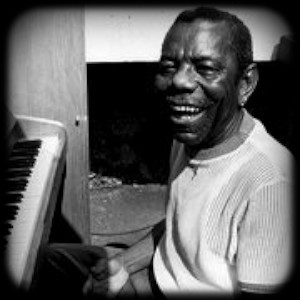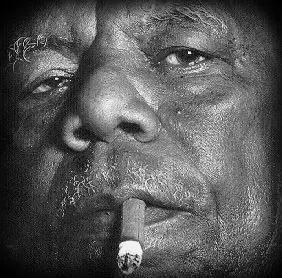‘CHAMPION JACK’ DUPREE

'Champion Jack' was not a great piano virtuoso, a stunning singer or a prolific songwriter, but he could play a huge variety of piano Blues styles and he took them around the world, thrilling audiences wherever he went.
His affable stage presence and endless supply of funny stories made him a great entertainer and a favourite on the Festival circuit.
A native of New Orleans, Jack was orphaned as a baby when, in about 1911, both parents were killed in a house fire.
Jack grew up in the same Colored Waifs home as Louis Armstrong and learned to play piano while hanging round the cat-houses in the Storyville neighborhood.
His mentor was Willie 'Drive 'Em Down' Hall, who taught him to pound out rough barrelhouse Blues.
By 1930, Jack had moved to Chicago, but after a year of playing at the Continental Cafe and bootlegging whisky, he left town for Detroit. When Joe Louis saw Jack at the gym, he encouraged him to take up boxing and he was soon fighting professionally out of Indianapolis, becoming lightweight Champion of Illinois and fighting over 100 bouts.
The original 'Junkers Blues' from 1941;
Piano playing was very much a part-time activity at this point, as he also made a good living as a cook, but 'Champion Jack' came to the notice of producer Lester Melrose, and recording sessions were arranged for Okeh in 1940 and 1941.
Before his recording career could take off, Jack was drafted into the Navy, got captured by the Japanese and spent two years in a Prisoner of War camp.
When he returned to the States, Jack hung around the clubs and bars of New York, where he recorded some fine Blues and boogie-woogie, sometimes in the company of Brownie McGhee.
He also recorded under the nom-de-Blues of Meat Head Johnson, Lightnin' Jr. and Brother Blues. One of those earlier Okeh numbers, 'Junkers Blues', Jack's song about drugs, turned up reworked as Fats Domino's first hit, 'The Fat Man' in 1949.
Recommended Album
This two album CD is taken from Champion Jack's late 50s Atlantic recordings, when he was at the peak of his powers.
The 50s saw Champion Jack emerge as one of the most influential piano Blues players on the scene.
Artistic transmission from this man who learned his chops in the cat-houses of New Orleans and was now heard regularly on the radio and on record, could be felt in the work of Memphis Slim and Fats Domino in particular.
Jack spent the first five years at King Records, where he had a chart hit with 'Walkin' the Blues', before moving to Atlantic, where he cut the seminal 'Blues from the Gutter' album.
This gave us definitive versions of 'Junkers Blues', 'Can't Kick the Habit' and 'TB Blues' as well as classics like 'Frankie and Johnny' and 'Stack-O-Lee'.
He then cut the talking Blues, 'Big Leg Emma's', which described a Police bust at a party, and could be one of the first proto-rap records.
'Alberta' has a distinct flavour of New Orleans;
In 1959 Jack moved to Europe to escape the racial prejudice endemic in US society before the 60s Civil Rights movement; he was quoted as saying, “I'd rather go to jail than go back there.”
He lived in Paris and Switzerland before settling in Halifax, England and marrying a local girl.
He found all the work he could handle in the growing circuit of British Blues clubs, and cut the 'New Orleans to Chicago' album in 1966 with Eric Clapton, John Mayall, Keef Hartley and TS McPhee.
Jack's warm engaging character came across to everyone who saw him play, and he was welcomed at concerts and Blues Festivals all over Europe.
He continued a steady rather than spectacular recording career, returning to New Orleans in 1990 to record the albums, 'Back Home' and 'One Last Time'.
'My Home in Louisiana' is a lovely drag-out piano Blues.
Jack was over 80 when he cut his last sessions, and tracks like 'Give Me Flowers While I'm Living' and 'You Can Make It' have specific, even humorous, reference to his death, which finally arrived in Hanover, Germany in 1992.
'Champion Jack' was never one to turn away from the realities of life (or death) and he put everything he had into his Blues.
You have to give 100% to be a Champion.
